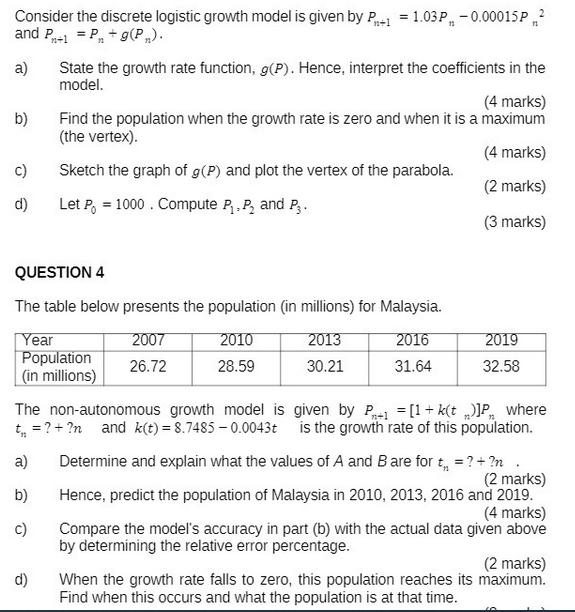Answered step by step
Verified Expert Solution
Question
1 Approved Answer
Consider the discrete logistic growth model is given by P+1 = 1.03 P-0.00015P and P+1=P+g(P). a) b) C) d) State the growth rate function,

Consider the discrete logistic growth model is given by P+1 = 1.03 P-0.00015P and P+1=P+g(P). a) b) C) d) State the growth rate function, g(P). Hence, interpret the coefficients in the model. (4 marks) Find the population when the growth rate is zero and when it is a maximum (the vertex). Sketch the graph of g(P) and plot the vertex of the parabola. Let P = 1000. Compute P, P and P. QUESTION 4 The table below presents the population (in millions) for Malaysia. 2007 2010 2013 2016 26.72 28.59 30.21 31.64 d) Year Population (in millions) (4 marks) (2 marks) (3 marks) 2019 32.58 The non-autonomous growth model is given by P1 = [1 + k(t)]P, where t = ?+ ?n and k(t)= 8.7485-0.0043t is the growth rate of this population. a) b) C) Determine and explain what the values of A and B are for t = ?+ ?n. Hence, predict the population of Malaysia in 2010, 2013, 2016 and 2019. (2 marks) (4 marks) Compare the model's accuracy in part (b) with the actual data given above by determining the relative error percentage. (2 marks) When the growth rate falls to zero, this population reaches its maximum. Find when this occurs and what the population is at that time.
Step by Step Solution
★★★★★
3.35 Rating (142 Votes )
There are 3 Steps involved in it
Step: 1
a The growth rate function gP is given by gP 000015P2 103P In this function the coefficient 000015 r...
Get Instant Access to Expert-Tailored Solutions
See step-by-step solutions with expert insights and AI powered tools for academic success
Step: 2

Step: 3

Ace Your Homework with AI
Get the answers you need in no time with our AI-driven, step-by-step assistance
Get Started


